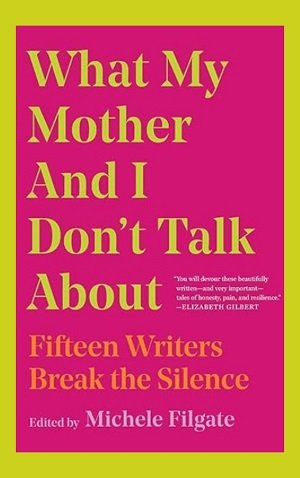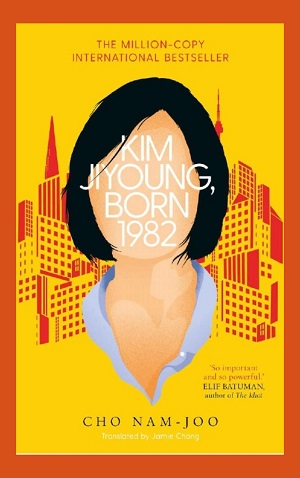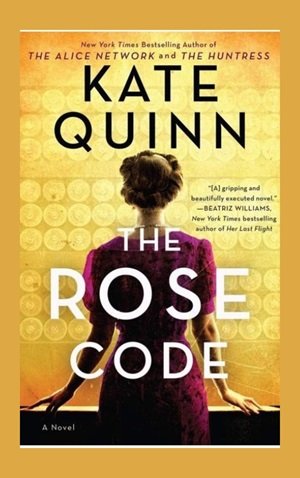Introduction
This book compiles 15 essays by writers delving into their relationships with their mothers. It highlights the void of some experience, yearning for a motherly presence not reflected in their own. It serves as a catharsis for challenging topics. I appreciated it for revealing our shared human experiences transcending culture, ethnicity, or sexual orientation. I admire the authors’ vulnerability, though some essays were less captivating.
Conversely, others effectively conveyed their feelings, resonating with me as a reader. Nayomi Munaweera’s “Her Body/My Body,” addressing life with a bipolar mother, particularly struck a chord with me. Additionally, Munaweera recommends “Understanding the Borderline Mother,” a topic for a future post. This book gave me valuable insights to comprehend my mother and myself, freeing me from guilt and biases.
May my remarks encourage you to explore this book, especially if your mother-child relationship faces challenges. I’ll share insights on essays I enjoyed, yet I suggest delving into the entire collection, as each person brings their unique life story and perspective.
Break the Silence
In the book’s introduction, Michele Filgate discusses her relationship with her mother and how it catalyzed this project. She drew inspiration from Jo Ann Beard’s essay collection, “The Boys of My Youth,” understanding that “a personal essay is a place where a writer can take control of his or her own life.”
Many of us hold an idealized image of a mother’s role, yet not all can fulfill these expectations. As Lynn Steger Strong aptly put it:
“There is a gaping hole perhaps for all of us, where our mother does not match up with ‘mother’ as we believe it’s meant to mean and all it’s meant to give us.”
This quote prompted me to contemplate how different my life might be if my mother had been entirely different. It also raised the question of what kind of mother I would be if I chose that path.
For instance, my mother’s bipolar disorder caused me considerable emotional instability. Paradoxically, it also nurtured resilience and a drive to overcome challenges. I grappled with issues related to femininity, associating it with weakness. After significant internal work, I now sense a promising balance between my feminine and masculine energies.
The tumultuous relationship with my mother drove me to reject many aspects of feminine energy. I was determined not to be a dependent, feeble woman or a victim of the world. Yet, my mother’s influence brought forth solid values and good habits, now integral to my character. She was a nurturing mother to my siblings and me, instilling virtues that have shaped us into good citizens.
Despite my yearning for a different kind of mother-daughter bond and a more “typical” relationship, I’ve come to feel gratitude and contentment for our journey.
What My Mother and I Don’t Talk About Essay
In this passage, Michele Filgate recounts her childhood and teenage years, revealing a complex relationship with her mother. She narrates her torment from her stepfather, who cruelly labeled her a “bitch,” while her mother focused on her spouse over her daughter.
Furthermore, she exposes her inner reflections and the dynamics of her connection with her mother, characterized by a heavy silence. As her stepfather insisted that “good girls” should remain quiet, she points out, “Bad girls kneel on uncooked rice, the hard pellets digging into their exposed knees.”
The prevalence of such beliefs, which impose women’s perpetual silence as a virtue, raises the question of who truly benefits from this imposed muteness. Fortunately, in today’s world, women in many regions have achieved a more fair and respectful balance. They are speaking up, no longer being deemed “crazy”; their thoughts and words are embraced with respect.
My Mother’s (Gate) Keeper
This essay, penned by Cathi Hanauer, an American novelist and journalist, intrigued me due to her parents’ love story. It unveils the nature of marriages in the past and how women of that era accepted behavior that would be seen as submissive today. When I say I liked it, it doesn’t imply approval of their marital conduct but rather my ability to empathize with the perspective from which many women lived as wives and mothers. For them, it seemed that conforming to certain behaviors was crucial for achieving happiness and a home they could take pride in. In my case, it wouldn’t be the same, but I understood their viewpoint without necessarily embracing it.
Cathi’s mother rarely contradicted her husband and tolerated his control over every aspect, even their conversations. As a result, Cathi had limited opportunities for one-on-one interactions with her mother.
But, at age 81, there came a day when Cathi and her mother were finally alone, without her father’s presence. Cathi asked her questions about her life and marriage, seeking answers to comprehend her mother’s behavior. From their heartfelt conversation, a few points stand out:
- Cathi’s mother mentioned that their marriage endured because she had a capability for quickly forgetting things. Despite getting upset about many of her husband’s actions, she swiftly put them behind her. She believed that her short-term memory played a pivotal role in making her marriage work, perhaps as an escape from a reality she felt powerless to change.
- The lady acknowledged that her husband was demanding and possessive, but she accepted him as he was and shouldered responsibility for encouraging and enabling his attitude.
- And this point resonated strongly with me:
“I’d just rather not fight with him,” she said again. “He’s difficult, and it’s a challenge to always have to comply with his decisions, but it’s much easier to comply than to fight. To me, those things really don’t make much difference.”
She accepted that specific duties must be fulfilled and didn’t second-guess herself. She felt she had no alternative. It may have led many women to take behaviors that should not be considered normal simply because that’s what they were taught or because it was the norm. As a society, we must scrutinize established beliefs and conventions to evolve.
It was good that Cathi could have this conversation with her mother, finally understanding her true feelings and thoughts. Her mother is who she appears to be, and she’s chosen her path.
In the end, Cathi concludes:
“Unlike me, she didn’t and doesn’t need answers for all life’s questions; she made her bed at sixteen, and now, sixty-five years later, she still lies in it, sanguine and content. She is exactly what I see, and exactly what she wants to be; what she wants is, most of the time, just what she has, and the rest of the time she endures until things improve.”
Thesmophoria
It’s the tale of a daughter who fears revealing her inner struggles to her mother. Despite their closeness, her mother only glimpses this aspect when she reads her daughter’s debut book by Melissa Febos. This essay fascinated me by depicting how a mother’s love endures, even in the face of her child’s challenging behaviors, especially during adolescence and young adulthood.
The mother assures her:
“Listen to me,” she said, her voice steady and resolute, a hand beneath my chin. “You could never lose me. I will love you every day of your life. There’s nothing you could do to make me stop loving you.”
This passage moved me because I firmly believe that a mother’s love, despite its flaws, is everlasting. I’ve been fortunate to have parents who have consistently made me feel loved, especially my father. Deep down, I know my parents did their best with the knowledge they had.
Xanadu
The story narrates a young gay boy’s trouble with being sexually abused by the choir director at 12. It delves into the consequences of reporting the abuse and the subsequent judgments of those who believe the situation could have been handled differently or avoided. This narrative underscores the complexity of men addressing and reporting such acts, as society tends to perceive them as the more vigorous sex and doubts similar incidents could happen to them. Nonetheless, many men, like women, face sexual abuse and, for various reasons, find it equally challenging to speak up and report it.
Alexander shares his experiences with his fellow victims as they attempt to restrain the situation to maintain an appearance of strength. He acknowledges how the choir director exploited his vulnerability as a biracial boy in an area that frowned upon ethnically diverse couples. However, within the choir, he discovered acceptance. For the first time, Alexander felt a sense of belonging and, out of fear of losing his place, succumbed to being a victim of the director.
The loss of his father was a devastating blow to Alexander, thrusting him into supporting his mother and managing the household, all while concealing his true identity and sexual orientation.
Before the book’s publication, Alexander summoned the courage to reveal his true self to his mother. He wanted her to hear it directly from him rather than discovering it upon the book’s release. He explained that he concealed his preferences and feelings from her out of a desire to protect her.
This tale illustrates how children frequently keep their silence or hide aspects of their lives from their parents, believing it is to protect them from distress or due to a fear of not being understood, or even a fear of losing their love.
Fifteen
Bernice L. McFadden unveils her childhood overshadowed by an alcoholic father. She couldn’t comprehend why her mother felt pained every time she requested a visit to her grandmother. Her mother’s standard reply was, “You don’t know what your grandmother did . . . . One day. One day, I’ll tell you.” It wasn’t until a particular incident involving her granddaughter that Bernice’s mother finally disclosed her past at 15.
The revelation unveils that Bernice’s grandmother was a compulsive liar, crossing boundaries with her mother. In a manipulative bid to get her way, she falsely accused Bernice’s mother of theft in court. This act led to her mother’s imprisonment and a one-year sentence.
This tale underscores the tendency within families to guard secrets and how narratives have a knack for replaying across generations. It highlights open dialogue’s significance in breaking these cycles and preventing history from echoing.
“You knew our family was swimming in secrets, terrible secrets, that were too painful and shameful to discuss, and so they didn’t. They kept silent about the uncle who’d raped and impregnated at least two of his nieces, the brother who’d fondled his sister, and that aunt who tried and failed to drown her child in bathwater.”
I also believe this narrative suggests why many women resorted to early marriages as an escape from dysfunctional households. They perceived marriage as the sole remedy for their family issues. Could it be that even today, many women wed to flee their toxic family environments?
Mother Tongue
Carmen María Machado’s essay delves into her contemplations about motherhood as she confronts this prospect with her wife. It raises questions about whether to embark on the journey of motherhood while dealing with a somewhat distant relationship with her mother.
Within this narrative, I found resonance in three passages that mirror my sentiments, much like Carmen:
“Because my identity has been shaped by what she is not; she is, for me, an example of how not to conduct a life. I believe that her pride in my accomplishments—and her love for me—is actively.”
“I think my mom wanted to live a selfish existence. I do not think she imagined herself struggling to find her identity in her forties, fifties, sixties. And I don’t blame her. I want to be selfish, too.”
Since my childhood, my mother attempted to mold me into the fulfillment of her dreams. She would persistently say, “I want you to get married, to have children.” I’d always respond, “Mom, those are your dreams, not mine.” Regrettably, she could never accept this. I continue to suspect that she doesn’t. Marriage never danced in my dreams; I’ve cohabitated with my partner for 11 years without the inclination for matrimony. Our relationship’s foundation necessitates no parchment or ceremony.
Moreover, my decision to forgo motherhood was an arduous pill for her to swallow. She yearned to be a grandmother to my offspring, yet my siblings had already handed her grandchildren. Perhaps she reconciled herself to the fact that I embody everything contrary to her expectations. She no longer offers any commentary, for there remains nothing to convey; this life is my own, and I’ve elected to navigate it as I want to, regardless of her or anyone else’s opinions. In this path, I have found contentment and serenity.
“That I feel bad for her that she is so dissatisfied with her own life; I wouldn’t wish that on my worst enemy.”
My mother, sadly, constantly laments about nearly everything; barely anyone or anything aligns with her expectations. This ongoing behavior often engenders fatigue in me. Nowadays, I encourage her to nurture gratitude for her many blessings to focus on the positive rather than the negative. I was once trapped in a similar mood, yet when I overhear my complaints, I promptly reflect and work to amend my outlook. I’m committed to harnessing the power of optimism and gratitude.
Her body / My body
Nayomi Munaweera’s narrative deeply resonated with me because, like her, my mother also grapples with bipolar disorder. I identified numerous parallels in our experiences while navigating life with a mother bearing this ailment. Exploring this disorder offered insights into my mother’s behavior and myself, ceasing self-judgment and the weight of undeserved blame. Slowly, I liberated myself from deeply ingrained limitations and beliefs.
For children of mothers afflicted by bipolar or borderline personality disorders, creating a safe distance is often a prudent strategy. In my situation, the most viable course was to live in another country. This geographical separation has, to some extent, contributed to a more stable and less contentious relationship. There was no imperative need to dissolve ties, as I learned to navigate her condition, accept it, and recognize that many of her actions are manifestations of her illness or her inherent character.
This essay will strike a chord with those with family members wrestling with mental illnesses.
Conclusion
This book is invaluable for comprehending that many of us have undergone similar ordeals, affirming that we are not isolated. It also allows us to witness the actions of individuals confronting challenging circumstances, demonstrating that defeating obstacles is constantly conceivable. Through their natural portrayal of vulnerability, these authors serve as inspirations, urging us to be courageous and voice what we’ve often concealed due to shame or apprehension.
What My Mother and I Don’t Talk About encourages us to reconnect with our inner child and ease the healing of childhood experiences that continue to influence our lives. These pages will prompt you the desire to read this book. It will be a reflective and refreshing read for those who resonate with these life stories. If you sense that there are unresolved issues within you, continue seeking help through books like this one or other available resources.



